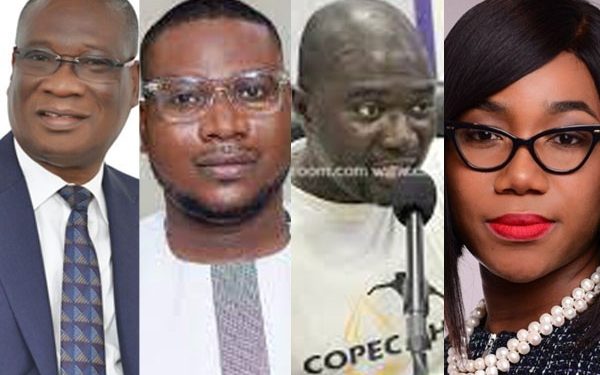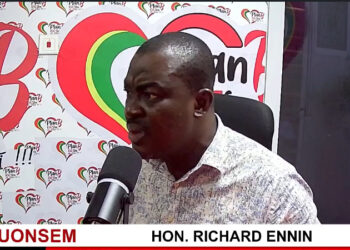The Ghana National Petroleum Corporation (GNPC) CEO, has reduced the ongoing debate on the government’s plans to buy the stakes in some two oil blocks to mere noisemaking by those at the forefront demanding transparency and accountability in the US$1.65 billion transaction described as worse than PDS and Agyapa deals.
According to Dr K.K. Sarpong, whose enigma is in his silence, the Corporation’s deafening silence, has been intentional to allow the Civil Society Organizations (CSOs) to air their views and grievances adding, this clever tactic has been employed to avoid responding to “every little noise” the CSOs may make in connection with the GNPC-Aker Energy-AGM controversy.
But this could be further from the truth as several reports available show that officials of GNPC and Aker Energy, were moving from the offices of the CSOs lobbying them, as well as doling out money in envelopes to influence them to support the controversial transaction, when it is presented before Parliament for approval.
The Herald, last week dropped the names of the Deputy Chief Executive of GNPC, Joseph Dadzie and the Country Director of the Aker Energy, Kadija Amoah, as acting on behalf of both the buyer and the seller moving from office to office together to silence the CSOs.
Among the CSOs the two met; included Mensah Thompson of the Alliance for Social Equity and Public Accountability (ASEPA) and Executive Secretary at the Chamber of Petroleum Consumers (COPEC), Duncan Amoah.
Aside many Civil Societies, some Members of Parliament as well as Ghanaian journalists have been mentioned as compromised hence “playing soft ball” on the transaction described as worse the botched Agyapa Royalties transaction and the PDS consortium deal.
But whilst, Mensah Thompson in an interview with The Herald disclosed he was given GHC10, 000 by Joseph Dadzie and KadijaAmoah after discussions with him at the car park of a friend’s office whose name he won’t disclose, Duncan Amoah, told The Herald he was given GHC30,000 by the two who had come to his office in the company of Evans Mensa, a journalist with Joy FM.
Evans has told The Herald that he does some consultancy for Aker Energy, that his employers; the management of Multimedia, have been informed about this and they allowed him to do this which, includes working on Aker Energy’s media engagements.
He persistently described as “false” Duncan Amoah’s statement that he was in his office with Joseph Dadzie and KadijaAmoah to elicit COPEC’s support and also give him money.
While, ASEPA’s Mensah Thompson, who described the money from GNPC and Aker Energy as “something small” appears to have spent the GHc10,000, as he virtually kept jumping around the question when The Herald called about the meeting and the fact that money exchanged hands, COPEC’s Duncan Amoah, insists the money was available and could be produced on demand.
Both Duncan Amoah and Mensah Thompson separately told The Herald, they were not the only ones that Joseph Dadzie and KadijaAmoah met and gave money to.
Duncan in particular, opined that Steve Manteaw, got more than everyone, hence his spirited defense of the deal against the position of Ben Boakye of African Center for Energy Policy and Bright Simons of the IMANI Ghana, demanding transparency and accountability ahead of GNPC forking out over US$1 billion dollars to invest in unverified and unquantified oil blocks.
According to them, the deal threatens Ghana’s economic and fiscal outlook.
GNPC, had previously asked parliament to approve a loan of $1.65 billion for the acquisition of a 70% stake in the South Deep Water Tano (SDWT) operated by AGM Petroleum Ghana Limited and a 37% stake in the Deep Water Tano/Cape Three Points (DWT/CTP) operated by Aker Energy Ghana Limited.
Whilst, the CSOs acknowledged in a petition that its members are not opposed to the government of Ghana increasing its stake in natural resource ownership, it warned the deal was not in the interest of Ghanaians in the absence of a credible evaluation report, on the blocks including how much money AKER and AGM.
It has been reported that AGM holds shares of Fuel Trade likened to the GNPC boss, while QUAD Energy is linked to Akufo-Addo family.
Meanwhile, the GNPC boss, has claimed that at the appropriate time; the GNPC will soon assemble all the claims made by the CSOs and do justice to them appropriately adding, the CEO said their opposition to the deal is a normal reaction to change.
“I must say that obviously, any new thing faces resistance. It is something you easily find in management literature. People resist change. And then anything new raises doubts, people are concerned, it’s natural, the fear of the unknown.
“But I think it’s important that Ghanaians, we try and look at things objectively not to be moved by emotions, assemble the facts and tell the truth. And I think that is very, very important,” he said August 26 on JoyNews’ Upfront.
He, however, cautioned against the “deliberate distortions” of facts to garner distrust and opposition from the populace against the GNPC and its plans to increase Ghana’s stake in natural resource ownership.
“I believe we must have constructive comments, reasonable, objective conversations so that we can all take lessons from all that we’ve discussed to be able to shape policy,” he said.
On why GNPC is buying back the blocks it had sold for US$130 million some two years ago for over US$1 billion as argued by the CSOs, the GNPC boss explained that it was necessary for the company to have sold its shares in Ghana’s oil fields in 2019.
According to him, at that time the country didn’t have the funds to invest in the oil fields, and that the necessary move was to sell the shares to unburden the country.
“The 24% was a commercial interest being held by Explorco at the time. The question is, at that time did we have the money to put in there? We didn’t have any,” he said.
He explained that even though they could have done what they’re proposing to do now, at that point they didn’t have the sense to do so.
“We never had the sense that we could – you see if the energy transition thing hadn’t been heightened I don’t think anybody prior should have that sense. And especially when ExxonMobil decided to leave after making the discovery they assessed it and they thought it wasn’t – from their risk expectation – something that they were particularly interested in so they wanted to leave. That was a clear signal,” he said.
He said the country still doesn’t have the money to make the investment, but considering the situation of the energy transition currently ongoing, the time was ripe for the GNPC to take over Ghana’s oil fields; thus the need for the government to approve the loan.
“If I felt at that time I had that sense that it was possible that that could be done I’m sure maybe I would have gone to the government and said ‘wait a minute’ but you see you also have to assess the strength to see what can be done.
“Now I’ve run the institution for nearly five years, I believe what I am talking about. I am very convinced that this is the path to go for our country if we are really prepared to take a greater chunk of these investments. It wasn’t a suggestion from Aker,” he stated.
In 2019, the Government of Ghana went to Parliament to make changes to agreements governing the country’s relationship with Aker’s key actors.
The combined effect of these changes led to Ghana relinquishing shares it owned in the two oil assets and drastically reducing the say it has in how they are managed.
These actions by the government were at the behest of the GNPC. However, the same GNPC has once again gone to parliament, asking the House to approve a loan of $1.65 billion for the acquisition of shares in Ghana’s offshore fields.
IMANI Africa Vice President, Bright Simons, reacting to the new development said “When the same GNPC comes back to advise the country of a need to spend hundreds of millions of dollars buying back the same shares and management involvement that Ghana barely a year and a half ago relinquished, we have a right to be outraged.”
“Especially when the country is losing hundreds of millions of dollars due to the earlier climb downs,” he added.
Experts have argued that Aker Energy and GNPC have teamed up to use GNPC to doll out money to purchase blocks by way of using the state to raise money after realizing that it does have the financial muscle to invest in the block with a certain sophisticated and expensive technology.
Other experts argue that Aker Energy had tried to have these shares sold on the London Stock Exchange but was ignored as investors did not find the blocks profitable.
It therefore, beats their imagination that Ghana is jumping at the same blocks ready to throw in US$1.65 billion without any expert valuation report except that which was made by Aker Energy.










Discussion about this post